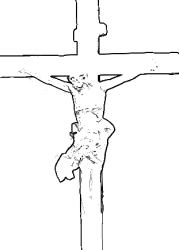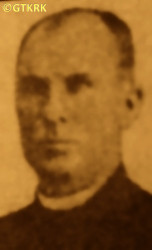Roman Catholic
St Sigismund parish
05-507 Słomczyn
85 Wiślana Str.
Konstancin deanery
Warsaw archdiocese, Poland
full list:
displayClick to display full list

searchClick to search full list by categories
wyświetlKliknij by wyświetlić pełną listę po polsku

szukajKliknij by przeszukać listę wg kategorii po polsku

Martyrology of the clergy — Poland
XX century (1914 – 1989)
personal data
surname
BRYDYCKI
forename(s)
John (pl. Jan)

function
diocesan priest
creed
Latin (Roman Catholic) Church RCmore on
en.wikipedia.org
[access: 2014.09.21]
diocese / province
Kamianets diocesemore on
en.wikipedia.org
[access: 2013.05.23]
Lutsk‐Zhytomyr diocese (aeque principaliter)more on
www.catholic-hierarchy.org
[access: 2021.12.19]
date and place
of death
1937

Kamyanets‐Podilskyitoday: Kamyanets‐Podilskyi urban hrom., Kamyanets‐Podilskyi rai., Proskuriv/Khmelnytskyi obl., Ukraine
more on
en.wikipedia.org
[access: 2021.09.17]
details of death
In 1908 tried in Owrucz for illegal religious education to children of Pelcza village.
Stopped by a group of young Russians in 1935 in Kamyanets‐Podilskyi.
Hanged upside down on a tree and set on fire.
Rescued and hid by local Poles in nearby Surzyńce village and next in Piąta Góra farm n. Kamyanets‐Podilskyi.
In 04.1936 arrested again and transported to Kiev prison.
According to some sources released from Kiev.
Returned to Kamyanets‐Podilskyi and there perished in unknown circumstances.
alt. details of death
According to other sources sentenced by the Russians to 5 years of slave labour in Russian concentration camps? Fate thereafter unknown.
cause of death
extermination
perpetrators
Russians
sites and events
11.08.1937 Russian genocideClick to display the description, Great Purge 1937Click to display the description, GulagClick to display the description, Forced exileClick to display the description, Kiev (Lyukyanivska)Click to display the description
date and place
of birth
1872

presbyter (holy orders)
ordination
1898

positions held
administrator — Kamyanets‐Podilskyitoday: Kamyanets‐Podilskyi urban hrom., Kamyanets‐Podilskyi rai., Proskuriv/Khmelnytskyi obl., Ukraine
more on
en.wikipedia.org
[access: 2021.09.17] ⋄ St Nicholas the Bishop and Confessor RC parish (post‐Dominican) ⋄ Kamyanets‐Podilskyitoday: Kamyanets‐Podilskyi urban hrom., Kamyanets‐Podilskyi rai., Proskuriv/Khmelnytskyi obl., Ukraine
more on
en.wikipedia.org
[access: 2021.09.17] RC deanery
c. 1918
administrator — Hranivtoday: Krasnopilka hrom., Haisyn rai., Vinnytsia obl., Ukraine
more on
uk.wikipedia.org
[access: 2021.09.17] ⋄ Transfiguration of the Lord RC parish ⋄ Bratslavtoday: Bratslav hrom., Tulchyn rai., Vinnytsia obl., Ukraine
more on
en.wikipedia.org
[access: 2021.09.17] RC deanery
c. 1910 – c. 1918
dean — Ovruchtoday: Ovruch urban hrom., Korosten rai., Zhytomyr obl., Ukraine
more on
en.wikipedia.org
[access: 2021.09.17] RC deanery
1903 – c. 1918
parish priest — Velidnykytoday: Novi Velidnyky, Slovechno hrom., Korosten rai., Zhytomyr obl., Ukraine
more on
en.wikipedia.org
[access: 2023.03.02] ⋄ Holy Trinity RC parish ⋄ Ovruchtoday: Ovruch urban hrom., Korosten rai., Zhytomyr obl., Ukraine
more on
en.wikipedia.org
[access: 2021.09.17] RC deanery
1900 – 1903
administrator — Sokiltoday: Sokul hrom., Lutsk rai., Volyn obl., Ukraine
more on
uk.wikipedia.org
[access: 2022.07.05] ⋄ Assumption of the Blessed Virgin Mary RC parish ⋄ Lutsktoday: Lutsk city rai., Volyn obl., Ukraine
more on
en.wikipedia.org
[access: 2021.09.17] RC deanery
c. 1899
administrator — Dubnotoday: Dubno urban hrom., Dubno rai., Rivne obl., Ukraine
more on
en.wikipedia.org
[access: 2020.11.27] ⋄ St John of Nepomuk the Martyr RC parish ⋄ Lutsktoday: Lutsk city rai., Volyn obl., Ukraine
more on
en.wikipedia.org
[access: 2021.09.17] RC deanery
till 1898
student — Zhytomyrtoday: Zhytomyr urban hrom., Zhytomyr rai., Zhytomyr obl., Ukraine
more on
en.wikipedia.org
[access: 2021.09.17] ⋄ philosophy and theology, Theological Seminary
sites and events
descriptions
11.08.1937 Russian genocide: On 11.08.1937 Russian leader Stalin decided and NKVD head, Nicholas Jeżow, signed a «Polish operation» executive order no 00485. 139,835 Poles living in Russia were thus sentenced summarily to death. According to the records of the „Memorial” International Association for Historical, Educational, Charitable and Defense of Human Rights (Rus. Международное историко‐просветительское, правозащитное и благотворительное общество „Мемориал”), specialising with historical research and promoting knowledge about the victims of Russian repressions — 111,091 were murdered. 28,744 were sentenced to deportation to concentration camps in Gulag. Altogether however more than 100,000 Poles were deported, mainly to Kazakhstan, Siberia, Kharkov and Dniepropetrovsk. According to some historians, the number of victims should be multiplied by at least two, because not only the named persons were murdered, but entire Polish families (the mere suspicion of Polish nationality was sufficient). Taking into account the fact that the given number does not include the genocide in eastern Russia (Siberia), the number of victims may be as high as 500,000 Poles. (more on: en.wikipedia.orgClick to attempt to display webpage
[access: 2016.03.14])
Great Purge 1937: „Great Terror” (also «Great Purge», also called „Yezhovshchyna” after the name of the then head of the NKVD) — a Russian state action of political terror, planned and directed against millions of innocent victims — national minorities, wealthier peasants (kulaks), people considered opponents political, army officers, the greatest intensity of which took place from 09.1936 to 08.1938. It reached its peak starting in the summer of 1937, when Art. 58‐14 of the Penal Code about „counter‐revolutionary sabotage” was passed , which became the basis for the „legalization” of murders, and on 02.07.1937 when the highest authorities of Russia, under the leadership of Joseph Stalin, issued a decree on the initiation of action against the kulaks. Next a number of executive orders of the NKVD followed, including No. 00439 of 25.07.1937, starting the liquidation of 25,000‐42,000 Germans living in Russia (mainly the so‐called Volga Germans); No. 00447 of 30.07.1937, beginning the liquidation of „anti‐Russian elements”, and No. 00485[2] of 11.08.1937, ordering the murder of 139,835 people of Polish nationality (the latter was the largest operation of this type — encompassed 12.5% of all those murdered during the «Great Purge», while Poles constituted 0.4% of the population). In the summer of 1937 Polish Catholic priests held in Solovetsky Islands, Anzer Island and ITL BelbaltLag were locked in prison cells (some in Sankt Petersburg). Next in a few kangaroo, murderous Russian trials (on 09.10.1937, 25.11.1937, among others) run by so‐called «NKVD Troika» all were sentenced to death. They were subsequently executed by a single shot to the back of the head. The murders took place either in Sankt Petersburg prison or directly in places of mass murder, e.g. Sandarmokh or Levashov Wilderness, where their bodies were dumped into the ditches. Other priests were arrested in the places they still ministered in and next murdered in local NKVD headquarters (e.g. in Minsk in Belarus), after equally genocidal trials run by aforementioned «NKVD Troika» kangaroo courts.
Gulag: The acronym Gulag comes from the Rus. Главное управление исправительно‐трудовых лагерей и колоний (Eng. Main Board of Correctional Labor Camps). The network of Russian concentration camps for slave labor was formally established by the decision of the highest Russian authorities on 27.06.1929. Control was taken over by the OGPU, the predecessor of the genocidal NKVD (from 1934) and the MGB (from 1946). Individual gulags (camps) were often established in remote, sparsely populated areas, where industrial or transport facilities important for the Russian state were built. They were modeled on the first „great construction of communism”, the White Sea‐Baltic Canal (1931‐1932), and Naftali Frenkel, of Jewish origin, is considered the creator of the system of using forced slave labor within the Gulag. He went down in history as the author of the principle „We have to squeeze everything out of the prisoner in the first three months — then nothing is there for us”. He was to be the creator, according to Alexander Solzhenitsyn, of the so‐called „Boiler system”, i.e. the dependence of food rations on working out a certain percentage of the norm. The term ZEK — prisoner — i.e. Rus. заключенный‐каналоармец (Eng. canal soldier) — was coined in the ITL BelBaltLag managed by him, and was adopted to mean a prisoner in Russian slave labor camps. Up to 12 mln prisoners were held in Gulag camps at one time, i.e. c. 5% of Russia's population. In his book „The Gulag Archipelago”, Solzhenitsyn estimated that c. 60 mln people were killed in the Gulag until 1956. Formally dissolved on 20.01.1960. (more on: en.wikipedia.orgClick to attempt to display webpage
[access: 2024.04.08])
Forced exile: One of the standard Russian forms of repression. The prisoners were usually taken to a small village in the middle of nowhere — somewhere in Siberia, in far north or far east — dropped out of the train carriage or a cart, left out without means of subsistence or place to live. (more on: en.wikipedia.orgClick to attempt to display webpage
[access: 2014.12.20])
Kiev (Lyukyanivska): Russian political prison in Kiev, in the first half of 20th century run by the genocidal NKVD, informally referred to as prison No 1, formally as Investigative Prison No 13 (SIZO#13). It was founded in the early 19th century. In the 20th century, during the Soviet times, the prison church was transformed into another block of cells. During the reign of J. Stalin in Russia, more than 25,000 prisoners passed through it. (more on: en.wikipedia.orgClick to attempt to display webpage
[access: 2014.09.21])
sources
personal:
biographies.library.nd.eduClick to attempt to display webpage
[access: 2014.12.20], www.pan-ol.lublin.plClick to attempt to display webpage
[access: 2021.12.19], jbc.bj.uj.edu.plClick to attempt to display webpage
[access: 2016.03.14]
bibliographical:
„Fate of the Catholic clergy in USSR 1917‐1939. Martyrology”, Roman Dzwonkowski, SAC, ed. Science Society KUL, 2003, Lublin
„Parish priest of Lutsk–Żhytomyr 1801‐1920 and Kamyanets–Podilskyi 1869‐1919 dioceses”, Fr Waldemar Witold Żurek SDB, Lublin 2023
LETTER to CUSTODIAN/ADMINISTRATOR
If you have an Email client on your communicator/computer — such as Mozilla Thunderbird, Windows Mail or Microsoft Outlook, described at WikipediaPatrz:
en.wikipedia.org, among others — try the link below, please:
LETTER to CUSTODIAN/ADMINISTRATORClick and try to call your own Email client
If however you do not run such a client or the above link is not active please send an email to the Custodian/Administrator using your account — in your customary email/correspondence engine — at the following address:

giving the following as the subject:
MARTYROLOGY: BRYDYCKI John
To return to the biography press below:
 Click to return to biography
Click to return to biography








